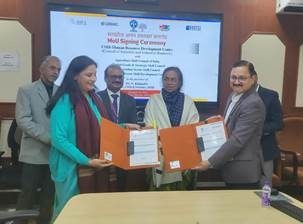
|
Getting your Trinity Audio player ready...
|
In a significant development aimed at enhancing the skill ecosystem in the country, the CSIR-Human Resource Development Centre (CSIR-HRDC), Ghaziabad (UP), has inked collaborative Memorandums of Understanding (MoUs) with four prominent Sector Skill Councils (SSCs).

The signing ceremony included the Agriculture Skill Council of India (ASCI), Capital Goods & Strategic Skill Council (CGSSC), Hydrocarbon Sector Skill Council (HSSC), and Life Sciences Sector Skill Development Council (LSSSDC). These strategic partnerships are designed to create a conducive environment for collaboration between CSIR and the Indian industry.
CSIR embarked on a national-level initiative, the “CSIR Integrated Skill Initiative,” in 2016 with the objective of equipping young minds with essential technological skills through exposure to CSIR laboratories. This initiative addresses the critical technical gap arising from the extensive use of advanced technology across various sectors.
Beneficiaries of this initiative include a diverse group ranging from school dropouts and farmers to ITI diploma holders, graduates, and doctorates. To date, over 1.50 lakh individuals have undergone skill-based training through 4500+ programmes, with special initiatives targeting rural citizens and women. The programme covers a spectrum of scientific clusters within CSIR, encompassing Biological, Chemical, Engineering, Information, and Physical Sciences.
The CSIR-Human Resource Development Centre (HRDC) serves as the central training unit of CSIR and functions as the Nodal Office for the skill initiative. It plays a pivotal role in the periodic review, monitoring, and evaluation of the initiative’s performance.
In a bid to further enhance the employability and entrepreneurship opportunities for Indian youth, CSIR-HRDC has entered into MoUs with four Sector Skill Councils – ASCI, CGSSC, HSSC, and LSSSDC. The collaboration is expected to facilitate the exchange of expertise between CSIR laboratories and SSCs, fostering joint programmes and leveraging each other’s services. The overarching goal is to boost employability and entrepreneurship opportunities for Indian youth, empowering them to participate actively in the global market.
This collaborative effort underscores the commitment of CSIR and the Sector Skill Councils to bridge the gap between skill development and industry requirements. By aligning their expertise and resources, they aim to create a dynamic and responsive skill ecosystem that addresses the evolving demands of the workforce and equips individuals with the necessary skills to succeed in a competitive global landscape.
India is strongly committed to cultivating digital skills among its citizens to meet the demands of an increasingly tech-dependent world. Recognising the transformative impact of technology on the workforce and economic growth, the country has launched various programs to equip individuals with digital literacy, coding, data analytics, and artificial intelligence skills.
OpenGov reported that AIIMS and IIT-Delhi have collaborated to develop an AI-powered simulator for training and assessing aspiring neurosurgeons in minimally invasive surgical techniques. This innovation aims to revolutionise the evaluation of neurosurgical skills, providing a benchmark for training and assessment in the field.
The Ministry of Electronics and Information Technology (MeitY) has launched the ‘Cyber Surakshit Bharat’ initiative to address the rising threat of cybercrime. This initiative aims to equip organisations with tools to defend their digital infrastructure and enhance the capabilities of Chief Information Security Officers (CISOs), and frontline IT officials.
As part of the initiative’s Capacity Building scheme, the National e-Governance Division (NeGD) organised the 41st CISO Deep-Dive training programme from January 16 to 20, 2024, at the National Law University in Gandhinagar, Gujarat, to fortify safety measures against cybercrime.
This strategic focus aims to bridge the gap between industry needs and available talent, fostering innovation, and inclusivity, and empowering and securing citizens for the digital era. India envisions a workforce that not only thrives in the digital age but also contributes significantly to national development and global competitiveness.
















